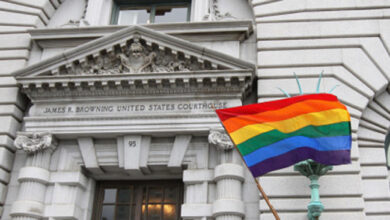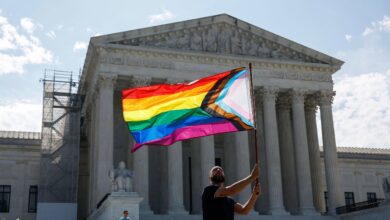
Thomas Casts Doubt on Precedent Amid Calls to Revisit Marriage Equality
Justice signals support for overturning rulings he deems “totally stupid.”

Justice Clarence Thomas is once again calling Supreme Court precedent into question, suggesting that past rulings—including those protecting marriage equality—should not be treated as sacred, even as conservative efforts to challenge Obergefell v. Hodges continue to mount.
Speaking at the Catholic University of America’s Columbus School of Law in Washington, D.C., the longtime conservative justice said he would not adhere to court precedent if he found it lacking in logic or legal grounding.
“I think we should demand that, no matter what the case is, that it has more than just a simple theoretical basis,” Thomas said, according to legal outlet Above the Law. “[If it’s] totally stupid, and that’s what they’ve decided, you don’t go along with it just because it’s decided. You could go up to the engine room and find that it’s an orangutan driving. And you’re going to follow that? I think we owe our fellow citizens more than that.”
“I don’t think that … any of these cases that have been decided are the gospel,” he added. “And I do give perspective to the precedent. But … the precedent should be respectful of our legal tradition, and our country and our laws, and be based on something – not just something somebody dreamt up and others went along with.”
Thomas’s comments have raised alarm among advocates of marriage equality, particularly in light of his concurring opinion in the 2022 decision to overturn Roe v. Wade, in which he explicitly called on the court to reconsider rulings protecting access to contraception, same-sex marriage, and private sexual conduct between consenting adults.
Thomas was one of four dissenting justices in the landmark 2015 decision Obergefell v. Hodges, in which the court ruled that bans on same-sex marriage were unconstitutional.
Though the court has not formally agreed to revisit Obergefell, nine states have introduced nonbinding resolutions urging it to do so. None have passed. Former Kentucky county clerk Kim Davis, who was sued for refusing to issue a marriage license to a same-sex couple, has also petitioned the court to overturn the ruling as part of her appeal—but the court has not taken up her case, and doing so would not automatically reverse the precedent.
If Obergefell were overturned, same-sex marriage would immediately become illegal in 31 states. However, the federal Respect for Marriage Act, signed into law by President Joe Biden in 2022, would continue to require federal recognition of same-sex and interracial marriages, and mandate that all states honor marriages performed in other states.
Justice Amy Coney Barrett, another member of the court’s conservative majority, recently touched on the issue in her new book. While she did not directly call for a reversal of Obergefell, she noted that “the court has held that the rights to marry, engage in sexual intimacy, use birth control, and raise children are fundamental, but the rights to do business, commit suicide, and obtain abortion are not.”
Barrett also weighed in during a recent interview with CBS News, saying: “You know, what the court is trying to do is see what the American people have decided. And sometimes the American people have expressed themselves in the Constitution itself, which is our fundamental law. Sometimes in statutes. But the court should not be imposing its own values on the American people. That’s for the democratic process.”
During her confirmation hearings, Barrett suggested the issue of marriage equality should be left to the states.
Despite the renewed focus from conservative justices and state lawmakers, public support for marriage equality remains strong. A recent Gallup poll found that 68 percent of Americans support same-sex marriage, including 88 percent of Democrats, 76 percent of Independents, and 41 percent of Republicans—the widest partisan gap recorded since Gallup began tracking the issue in 1996.










